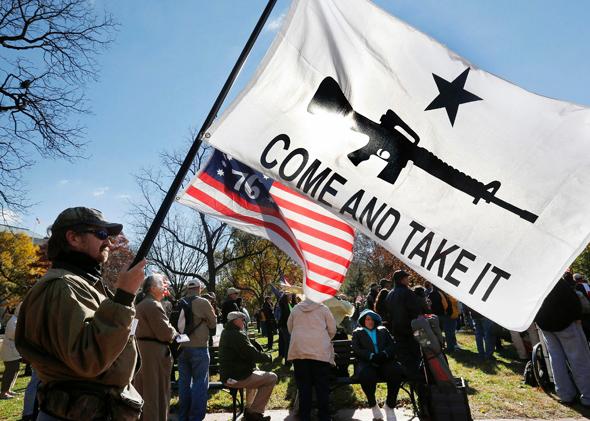During the past few months, America has made a number of statements about how it balances safety and security risks against the rights guaranteed in the Constitution. To review:
–Our movie theaters (Regal Entertainment Group, AMC Entertainment Holdings Inc., Cinemark Holdings Inc., and Carmike Cinemas Inc.) and movie studios (Sony in the case of The Interview, Paramount in the case of Team America: World Police) are afraid enough of a dubious threat of violence by North Korea that they’re voluntarily giving up their own First Amendment right to freedom of speech.
–A majority of respondents to a Washington Post/ABC survey are afraid enough of the threat of “terrorism” that they’re willing to ignore the Eighth Amendment’s prohibition of torture. Fifty-nine percent of those polled said the CIA’s treatment of post-9/11 terrorism suspects, as documented in the newly released Senate Intelligence Committee report, was justified. Though the Post/ABC poll left it up to respondents to decide whether the CIA’s treatment constituted torture, 50 percent of Americans in a 2013 Associated Press-NORC poll said that “torture” of suspected terrorists could “sometimes or often” be justified.
–A large majority of respondents to several polls in October were afraid enough of the possibility of contracting Ebola that they supported mandatory quarantines for anyone returning to the United States from a country suffering an Ebola outbreak—an approach that, given the lack of medical justification for isolating an individual who isn’t showing Ebola symptoms, would seem to violate the Fifth Amendment’s guarantee that Americans can’t be deprived of their liberty without due process.*
In our willingness to make the United States a less free society in order to protect ourselves, there is one notable outlier: the case of the Second Amendment. In fact, a Dec. 10 Pew survey found that, for the first time ever, more people in the United States believe it’s important to “protect the right of Americans to own guns” than to “control gun ownership.” Despite what could fairly be described, by developed-world standards, as an epidemic of gun violence—at least 30,000 people are killed by guns in our country each year, in situations ranging from suicide to domestic disputes to mass shootings—Americans continue to prioritize gun rights. Even in the aftermath of Sandy Hook, Congress declined to pass legislation requiring that private sellers conduct background checks on gun buyers, a rule that would likely increase public safety without ultimately infringing on regular citizens’ right to bear arms. When it comes to guns—but not free speech, due process, or the rights of criminal suspects—Americans’ commitment to individual freedoms overrides their fear of violence and/or death.
What’s with this contradiction? I can make sure I follow traffic laws and stay alert on the road, but there’s nothing I can do when turbulence hits besides trust the pilot, so flying is scarier even though I might know the fatality stats in the abstract. I can shoot an intruder with my own gun, but if I’m unarmed because of gun control laws and someone breaks into my house, there’s nothing I can do besides trust the police to react quickly (and trust that the government has been successful in keeping a gun out of the intruder’s hands as well), so gun control is scary even though I might know in the abstract that murders are rare in countries with heavy restrictions on firearm ownership. The through-line in America’s collective attitude toward constitutional rights isn’t principle—it’s the impulse to respond proactively to fear. In a world of endless real and perceived threats, owning a gun is a tangible action I can take to protect myself from them—just like torture, quarantines, and the suppression of Seth Rogen’s penis joke movie.
*Correction, Dec. 19, 2014: The piece originally misstated that the Sixth Amendment guarantees due process. The Fifth Amendment does. (Return.)
